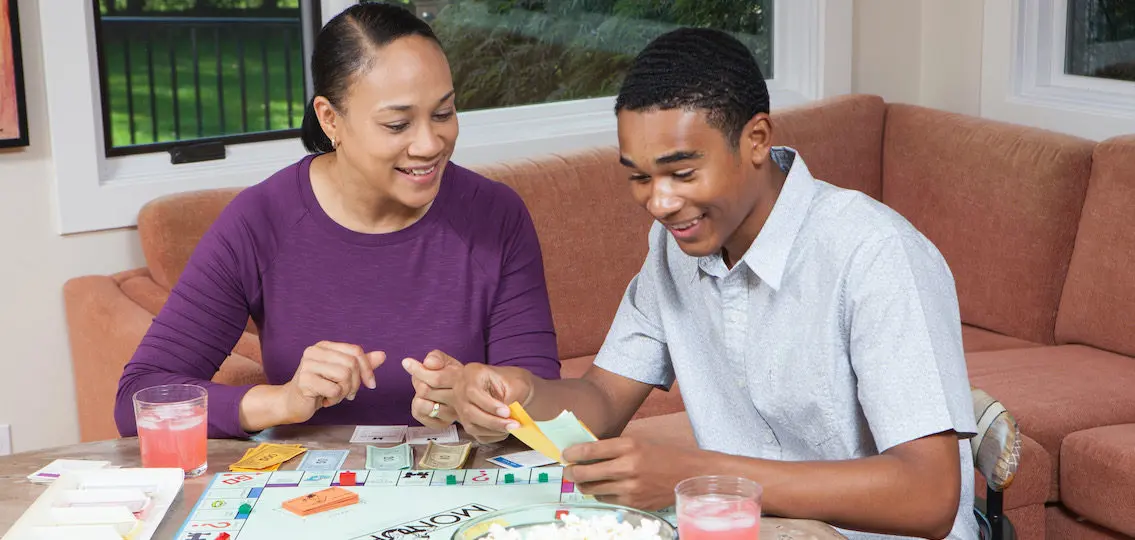The pressure to be on the go is one we all understand well. Our culture pushes the idea of productivity and the need to use time every second of our time. Many people, including our kids, live chronically over-scheduled lives.

In today’s world, people wear busyness like a badge of honor. If you aren’t always busy, do you even exist?
Technology increases our ability to organize and schedule activities and stay in touch with others. It also means, however, that as parents we often model overscheduled lives for our our overscheduled kids by using spare moments and evenings to do work or check emails from school.
It seems like these days sitting around and having long conversations about topics or just enjoying a simple moment rarely happens. It’s always rush, rush, rush.
On top of that, there are many adverse effects associated with busyness, such as stress that comes from being overscheduled and never having a moment to catch your breath.
I want my kids to know those quiet moments and long conversations are important. I want them to be able to savor silence, and not be afraid of unstructured time or boredom. I want them to see downtime as a chance to experience new ideas or activities. I want them to know it is okay to rest and rejuvenate. I want them to know they still have value if they spend some time doing nothing.
Somewhere along the road, I realized that if I wanted my kids to experience the benefits of being unbusy, I had to encourage it. I also can be guilty of using every minute to do something, and I want to model the behavior I want my tweens to emulate.
10 Easy Ways to be Unbusy:
1. Hiking
Getting back to nature is a great way to focus on unbusy, and hiking is an easy, cost-effective activity. The great thing about older kids is they can walk long distances because their bodies are now physically able. Hikes allow you to escape technology and can provoke great conversations. The best places are those where there is no cell reception, so you can’t be interrupted by the beeps and buzzes of your phone.
2. Reserving time
I aim to have an unscheduled day on the weekend with no sports or activities when possible. This allows for unbusy mornings and lazy afternoons with friends. It also gives us time to decompress.
3. Saying no
When my kids receive requests to hang out with a friend or go to an activity, if they seem tired or undecided, I remind them that it’s okay to say no and that they can make plans for another time. I try to teach my kids to respect their inner desire for unbusy time if that’s what they feel. It took me a long time to work out that sometimes my enthusiasm for nurturing friendships got in the way of my kids feeling like they could decline invitations.
4. Scheduling quiet time
When possible, the last hour before bed is time for reading or another peaceful activity. I try to avoid having my tweens doing homework or other stimulating activities right before bed.
5. Keeping vacation days unscheduled
I finally recognized that I always made plans when we had a day off of school. Either we were away on holiday, or we would have planned activities from morning to night. Now I try to leave some days as home days, so my kids can chill and do nothing.
6. Practicing mindfulness
I introduced my children to mindfulness apps when they were having difficulty relaxing to go to sleep. Mindfulness helps teach us to be present in the moment rather than chasing all the thoughts and feelings the mind demands. Mindfulness is a great skill to have as it allows you not to get caught up in guilty feelings or “should-have” thoughts. It teaches us to simply be okay with the stillness.
7. Allowing ourselves a full day for an experience
I noticed it was hard for me to spend a day in one place, such as a beach or a park. Our day often was structured into two-hour time slots, and we squeezed activities into bite-sized time frames. Now, I try to go somewhere with the intention of spending the whole day there. Nothing else.
8. Limiting after-school extracurricular activities
The major challenge for most families who feel overscheduled comes from extracurricular activities. One of my tweens would love to participate in something every day of the week. In the past, we tried to accommodate, but it led to a lot of stress since there was no downtime or moments to catch up because our schedule was too tight.
9. Unplugging
We live in a digital world, but that doesn’t mean there shouldn’t be off-time. Screens tend to encourage the idea of being entirely on and engaged—kind of the opposite of unbusy. So, I make sure there are specific times each day that are screen-free so we all can close the tabs on our minds.
10. Modeling
Because we learn from what we see, I try to make sure that I schedule some unbusy time, too. I try to avoid making statements about how I should be doing something productive, and instead, try to spend quality time with my family without simultaneously performing chores or checking emails.

On top of the lifelong benefits that I hope my tweens will gain from being unbusy, I’ve noticed another benefit: when we are unbusy together, we are more connected as a family—and we’re all a little happier.




